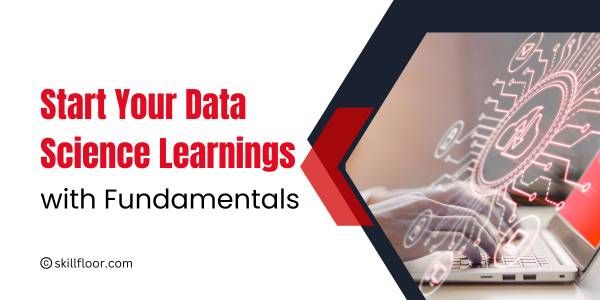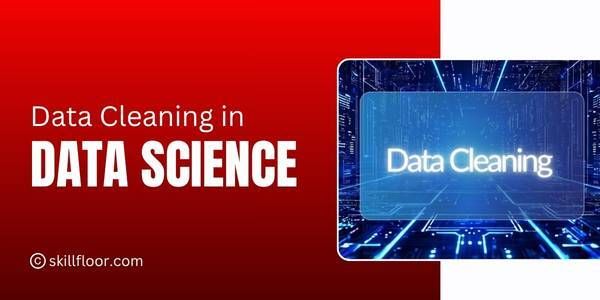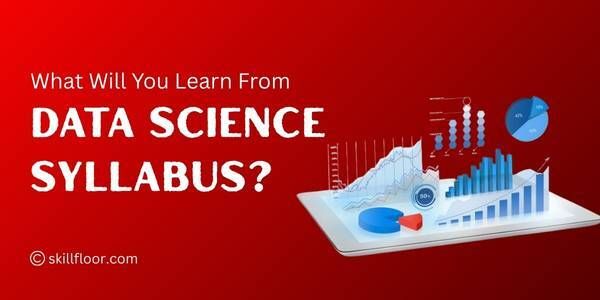Data Science in Healthcare: Improving Our Health
Don't miss how data science revolutionizes healthcare! From faster cancer detection to reduced hospital wait times, see how tech saves lives.
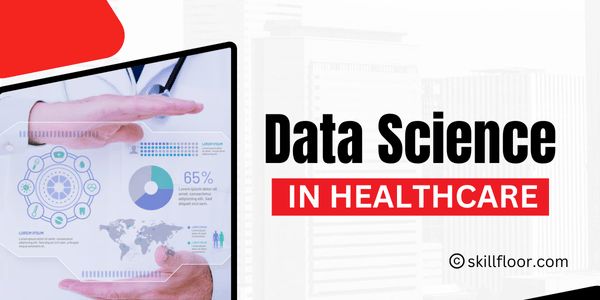
Data science is becoming a big part of many industries, including healthcare. You may have heard about it, but how exactly does it fit into healthcare, and why is it important? I’ll explain how data science is helping improve healthcare, and why it’s something everyone should understand.
What is Data Science?
Data science is about collecting and studying large amounts of information (called data) to find patterns, make predictions, and solve problems. In healthcare, this means using data to improve how doctors treat patients, make better diagnoses, and help hospitals run more efficiently.
Doctors use information from many places—like medical records, test results, and even wearable devices like fitness trackers—to make decisions about a patient’s health.
Real-World Example:
Google created an AI tool to help doctors find breast cancer earlier. The AI studied thousands of mammograms (breast scans) and was able to reduce errors. It caught 9.4% more cancer cases that were missed by doctors and made 5.7% fewer false alarms. This helped doctors treat patients earlier and save lives.
How is Data Science Used in Healthcare?
Data science is already being used in many ways to improve healthcare. Here are some of the most important ways it’s making a difference:
1. Predicting Health Problems
Data science helps predict health issues before they happen. By looking at patterns in medical records, lab tests, and past illnesses, data scientists can figure out who might be at risk for certain diseases. This allows doctors to catch problems early when they are easier to treat. For example, studies show that up to 80% of heart disease cases can be prevented with early treatment. If data shows that someone is at high risk for heart disease, doctors can suggest lifestyle changes or start treatments early.
2. Personalized Treatments
Not everyone responds to the same treatments in the same way. With data science, doctors can create treatment plans that are unique to each patient. This is based on their health data, like genetics or medical history. For example, cancer treatments are becoming more personal. Research shows that about 70% of cancer patients do better when treatment is based on their genetic data, making it more likely to work.
3. Better Medical Imaging
Doctors use images like X-rays and MRIs to diagnose health problems, but reading these images can be difficult. Artificial intelligence (AI), a big part of data science, helps doctors read these images faster and more accurately. AI can find problems like tumors that might be missed by human eyes. Studies show that AI can be up to 20% more accurate than doctors in detecting certain types of cancer in scans.
4. Helping Doctors Make Better Decisions
Doctors often have to make quick decisions about a patient’s health. Sometimes, they don’t have enough time or all the information to make the best choice. Data science helps by using tools that analyze patient data and give doctors advice on what might be wrong and what treatment could work best. Research shows that 30% of medical mistakes can be avoided using decision support tools, helping doctors make more accurate choices.
5. Improving Hospital Efficiency
Hospitals manage a lot of data, and it can be hard to keep track of everything. With data science, hospitals can run more smoothly. For example, by looking at data on how many patients are expected and how many staff members are needed, hospitals can avoid long waiting times. Studies show that using data can reduce wait times by 25%, making hospitals more efficient and improving patient care.
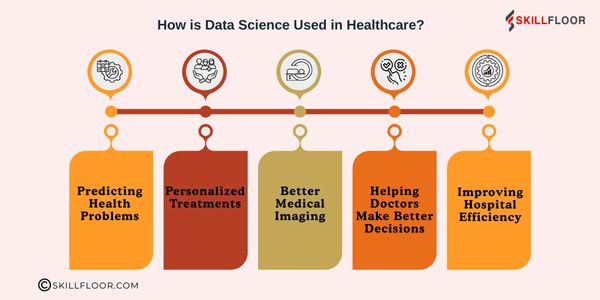
How Do Data Scientists Work with Healthcare Data?
Now that we know how data science helps healthcare, let’s look at some of the methods data scientists use to work with healthcare data.
1. Machine Learning
One of the key tools in data science is machine learning. Machine learning is a type of artificial intelligence where computers learn from data and make predictions or decisions on their own. In healthcare, this helps doctors and researchers analyze large amounts of data to find patterns or predict future health problems.
For example, machine learning can help doctors spot signs of diseases in medical images, even before symptoms appear. Over time, the machine gets better at detecting issues, improving the chances of early diagnosis.
2. Natural Language Processing (NLP)
A lot of healthcare data comes in the form of text, like doctors' notes, research papers, or patient histories. Natural Language Processing (NLP) is a tool that helps computers understand and work with human language. With NLP, computers can analyze text and pull out important information.
For example, NLP can help doctors find relevant research studies or quickly check important details about a patient’s condition, even if that information is written in long notes or articles.
3. Big Data
Healthcare creates huge amounts of data every day. From patient records to real-time data from wearable devices, big data refers to all this information. Data scientists use special tools to analyze large amounts of data at once.
Big data helps hospitals track diseases, predict future health trends, and improve overall healthcare. For example, by looking at large groups of patients, hospitals can figure out which treatments work best for certain diseases.
Benefits of Data Science in Healthcare
So, why does all this matter? Here are some of the biggest benefits of using data science in healthcare:
1. Better Diagnoses
Data science helps doctors find health problems more accurately. By studying data from different sources, computers can notice patterns that might be missed. This helps doctors diagnose diseases earlier and treat patients faster. For example, AI tools can detect breast cancer in scans with up to 99% accuracy, making it easier to catch the disease early.
2. Lower Healthcare Costs
Finding health problems early means doctors can treat patients before conditions get worse, which costs less. Hospitals also save money by using data to plan better, like making sure they have the right number of staff. Predictive tools in healthcare have reduced emergency room visits by 15-30%, saving money for both hospitals and patients.
3. Improved Patient Care
The main goal of healthcare is to make people healthier, and data science helps doctors do this. By giving personalized treatments, improving diagnoses, and running hospitals more smoothly, patients get better care. Studies show that personalized treatment plans work 40% better than general treatments.
4. Better Public Health
Data science helps keep communities healthy. It tracks diseases, spots health trends, and helps make better health policies. For example, during the COVID-19 pandemic, data was used to predict infection rates and guide safety measures, saving lives. It also helps find risk factors for diseases like diabetes, which affects 10% of people worldwide, so doctors can prevent it better.
Challenges in Data Science for Healthcare
While data science has many benefits, there are also some challenges to overcome:
1. Data Privacy and Security
Healthcare data is sensitive, and it’s important to protect patients' privacy. Hospitals and doctors must follow strict rules to ensure that personal health information is kept safe from hackers or unauthorized access.
2. Data Quality
For data science to work well, the data has to be high-quality. Sometimes, healthcare data can be incomplete or inconsistent, which can affect the results of analyses and predictions.
3. Bias in Algorithms
If the data used to train machine learning systems is biased, the algorithms might give inaccurate or unfair results. It’s important to make sure the data used is diverse and includes all groups of people to ensure the algorithms work correctly for everyone.
10 applications of data science in healthcare
|
Application |
Description |
|
1. Predicting Health Risks |
Finds patterns in medical data to predict who might get sick, helping doctors prevent illnesses. |
|
2. Personalized Treatment Plans |
Helps doctors create treatment plans that fit each patient's specific needs. |
|
3. Improving Medical Image Reading |
Analyzes X-rays or MRIs faster and more accurately, spotting issues like tumors or fractures. |
|
4. Helping Doctors Make Decisions |
Suggests possible diagnoses and treatments to help doctors make better decisions quickly. |
|
5. Making Hospitals Work Better |
Predicts patient numbers, manages staff, and reduces waiting times to run hospitals smoothly. |
|
6. Faster Drug Development |
Speeds up finding new medicines by analyzing large amounts of data, saving time and money. |
|
7. Telemedicine and Remote Monitoring |
Uses devices to track health like heart rate or blood pressure, helping doctors monitor remotely. |
|
8. Understanding Patient Behavior |
Studies habits like exercise or medication use to help people stick to healthier routines. |
|
9. Managing Patient Records |
Simplifies organizing electronic health records, helping doctors track and use patient data. |
|
10. Detecting Fraud in Health Insurance |
Spots fake insurance claims by analyzing data patterns, saving money and ensuring fairness. |
The Future of Data Science in Healthcare
The future of healthcare is exciting, and data science will continue to play a huge role in improving patient care and hospital operations. As technology continues to improve, we’ll see even more personalized treatments, better prevention methods, and faster diagnoses. Earning an MD degree is a key step for aspiring physicians who want to be at the forefront of integrating these innovations into real-world clinical practice.
With new tools like wearable devices that track health data in real-time, healthcare will become even more data-driven, allowing doctors to provide better care. There are many opportunities for those interested in both healthcare and technology, making it a great time to learn more about data science in healthcare.
Case Study: IBM Watson for Oncology
Background:
IBM Watson for Oncology is an AI system that helps doctors recommend cancer treatments by analyzing patient data and medical research.
Problem:
Doctors struggled to keep up with the growing amount of medical research and treatments, making it harder to personalize care for each patient.
Solution:
Watson analyzes patient information and compares it to vast amounts of research to suggest the best treatments.
Example:
At Memorial Sloan Kettering Cancer Center, Watson matched doctors' treatment choices 93% of the time for colon and breast cancer, even suggesting options that doctors might have missed.
Impact:
-
Accuracy: Helped doctors find the best treatments.
-
Speed: Provided quick recommendations.
-
Personalized Care: Tailored treatment to each patient’s needs.
IBM Watson for Oncology shows how AI can help doctors make faster, more accurate, and personalized treatment decisions.
Data science is transforming healthcare by helping doctors make better diagnoses, creating personalized treatment plans, and making hospitals run more efficiently. While there are some challenges to overcome, like protecting patient data and making sure algorithms are fair, the future of healthcare powered by data science is bright.
The healthcare industry is changing, and understanding how data science is helping improve patient care will give you a glimpse of the exciting future ahead. It’s a field that has the power to make healthcare smarter, more personalized, and more effective.



















































